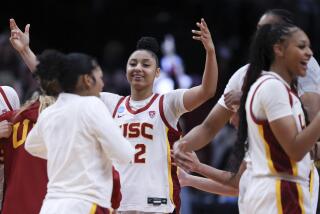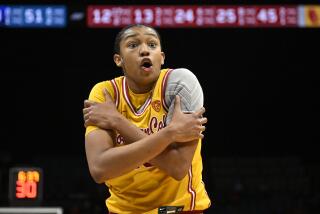After the tragedy
- Share via
The T-shirts the Baylor players wear say simply, “Justice.”
The slogan doesn’t mean to them what others might imagine after the tragedy and scandal of five years ago.
“It’s a little bit of a play on words,” guard Aaron Bruce said. “In our locker room, or out on the floor, it really is only, ‘Just us.’ So we just twisted the two different words a little bit.”
Far from Baylor’s Waco, Texas, campus, Brian Brabazon has T-shirts too. They are Baylor shirts that belonged to his stepson, Patrick Dennehy, the Bears player who was killed by a former teammate in 2003. Brabazon, who lives in Carson City, Nev., keeps wearing them, even as they fray and fade.
“I’m rooting for them,” he said. “I don’t hold any animosity against the Baylor Bears.”
For the Baylor players, the opening tip of their first-round NCAA tournament game against Purdue today in Washington, D.C., will be a moment of personal achievement that has little to do with the past.
For others, it will be a moment of catharsis.
“The first couple of years after Patrick died, I was happy to see them wallowing in less than mediocre circumstances,” Brabazon said. “I actually am glad it’s where it’s at now. Patrick always wanted to take a team into the NCAA tournament. And kind of in a roundabout way, I guess he did, really. His death changed the whole basketball team.
“I don’t hold any animosity against any of the kids or the coaches there now. They didn’t have anything to do with Patrick’s death.”
Carlton Dotson, the former player who underwent mental evaluations before pleading guilty to shooting and killing Dennehy, is serving a 35-year sentence in Texas.
Former coach Dave Bliss is out of basketball and living in Colorado. He resigned after the discovery of major NCAA violations and the revelation that he tried to mislead those investigating the basketball program by urging others to say the deceased Dennehy was a drug dealer.
Baylor under Coach Scott Drew has conquered NCAA probation and an exodus of players to go from three seasons of single-digit victories to a 21-10 record and the school’s first NCAA tournament appearance since 1988.
“I think this is a good moment for the phoenix rising,” said Baylor President John M. Lilley, who waited with a crowd of 700 on Sunday at Baylor to hear the school’s name called last among those in the NCAA field.
“This is a program that was below ground. To have a young coach like Scott Drew build it, and build it the right way. . . . It’s a great story.”
Drew, whose father, Homer, coached Valparaiso, and whose brother, Bryce, was a 1998 tournament hero for that school, took over a program that lost two of its best players when the NCAA waived the usual requirement that transfers sit out a year before playing elsewhere. John Lucas III left for Oklahoma State and helped that team reach the 2004 Final Four. Lawrence Roberts went to Mississippi State and became the Southeastern Conference player of the year.
“Morale was extremely low,” said Athletic Director Ian McCaw, who like Drew was hired after the scandal. “People felt really violated. There was anger, frustration, disappointment, embarrassment. One of the greatest qualities Scott has is he’s one of the most positive people I’ve ever met. That permeated the basketball program.”
Drew built the framework for the comeback with three top-20 recruiting classes in his first four years.
Guard Curtis Jerrells, the Bears’ leading scorer at 14.8 points per game, was the centerpiece of the class of recruits who are now juniors. Sophomore guard Tweety Carter was the first McDonald’s All-American to sign with the school. And freshman guard LaceDarius Dunn was ranked the 24th best prospect in the country by Scout.com, making him the highest-rated recruit in recent memory to choose Baylor.
“In our situation, people who knew about Baylor knew that what happened in the past was an isolated incident, and knew all the positives about Baylor,” Drew said. “The big thing about building a program is you want to recruit players with character who want to go have a chance to change the program.”
Some of the impact of the scandal was delayed. When NCAA penalties eventually were handed down, Baylor was banned from playing a non-conference schedule in 2005-06, going 4-13 against a Big 12-only schedule.
“A coaching staff and student-athletes who had nothing to do with that penalty were affected,” McCaw said. “It was very, very difficult.”
One season later, the Bears went 15-16. This season, they beat Notre Dame in November and won a five-overtime game against Texas A&M; in January.
Amid the giddiness of preparing for the NCAA tournament appearance, Baylor officials know their next challenge might be fending off schools trying to hire away the 37-year-old Drew.
“You know what?” said Jim Turner, a former player who is a member of the board of regents. “He’s earned everything he’s going to get and he deserves it.”
In Carson City, Brabazon -- now divorced from Dennehy’s mother, Valorie -- knows he might see pictures of his stepson and the friend who took his life on television broadcasts this week.
“Carlton, I think I’ve forgiven him,” Brabazon said. “It ruined Carlton’s life. It ruined his family and destroyed whatever future he had planned for himself. . . . I think he was delusional, maybe because of drugs.”
He feels less charitably toward Bliss.
“He comes to mind quite often. He’s a person that I probably will never forgive,” Brabazon said. “He knew Carlton had some mental problems and didn’t follow up enough. We sent Patrick to Baylor, so far away, and he assured me he would take care of him. And then afterward, what he tried to do to portray Patrick as someone who was a drug dealer paying his way through school. . . .
“But you know, Patrick’s friends and the people that knew him know what he is, or was. He was a competitor. He wanted to win.
“The thing that I personally want people to remember in Patrick’s death is it changed the way colleges treat their student-athletes. It wasn’t in vain. It did accomplish something.”
This week, people are asking Lilley, Baylor’s president since 2006, if it bothers him that Baylor’s success has brought back talk of what he called “an unspeakable tragedy.”
“My feeling is that that’s not all a bad thing. The tragedy is so great, it is a cautionary tale,” Lilley said. “People say, ‘You must hate hearing this negative story.’ But it’s not bad to be reminded that even at a Christian university, things go wrong. It shows the kind of vigilance that is necessary for all of us, at public universities, private universities, Christian universities.
“It’s way too fresh not to be part of this.”
--
More to Read
Go beyond the scoreboard
Get the latest on L.A.'s teams in the daily Sports Report newsletter.
You may occasionally receive promotional content from the Los Angeles Times.










